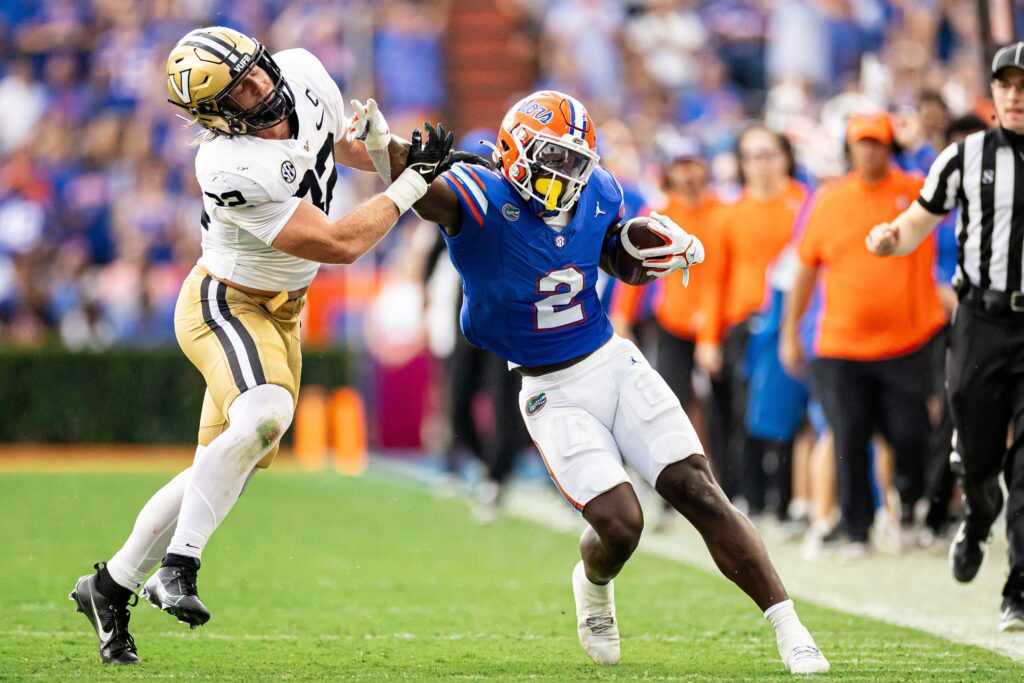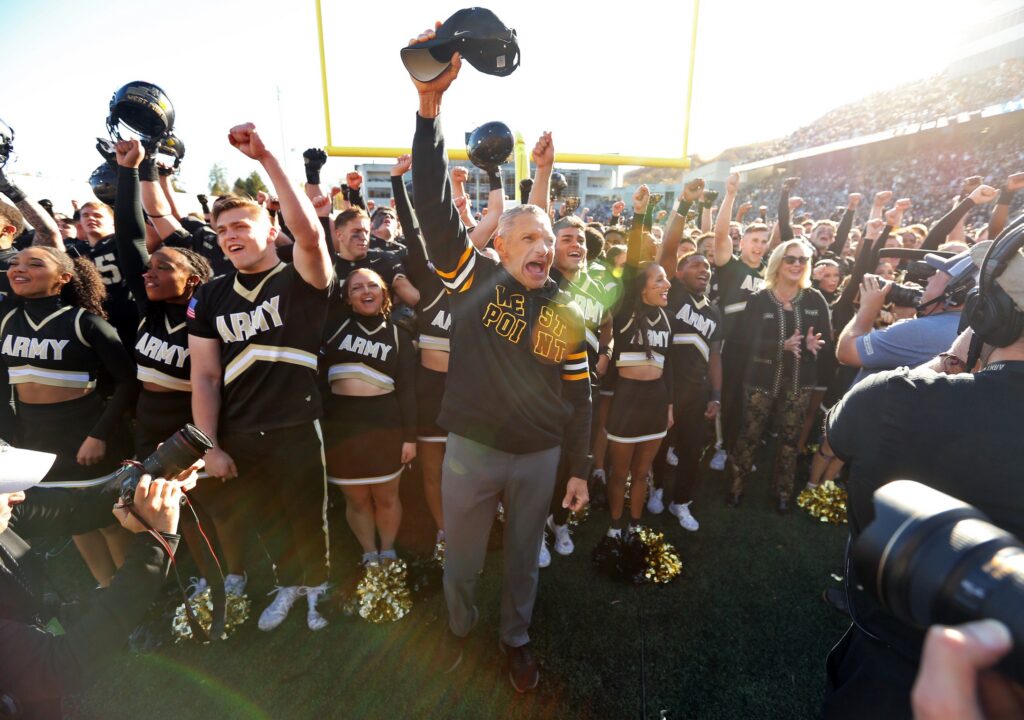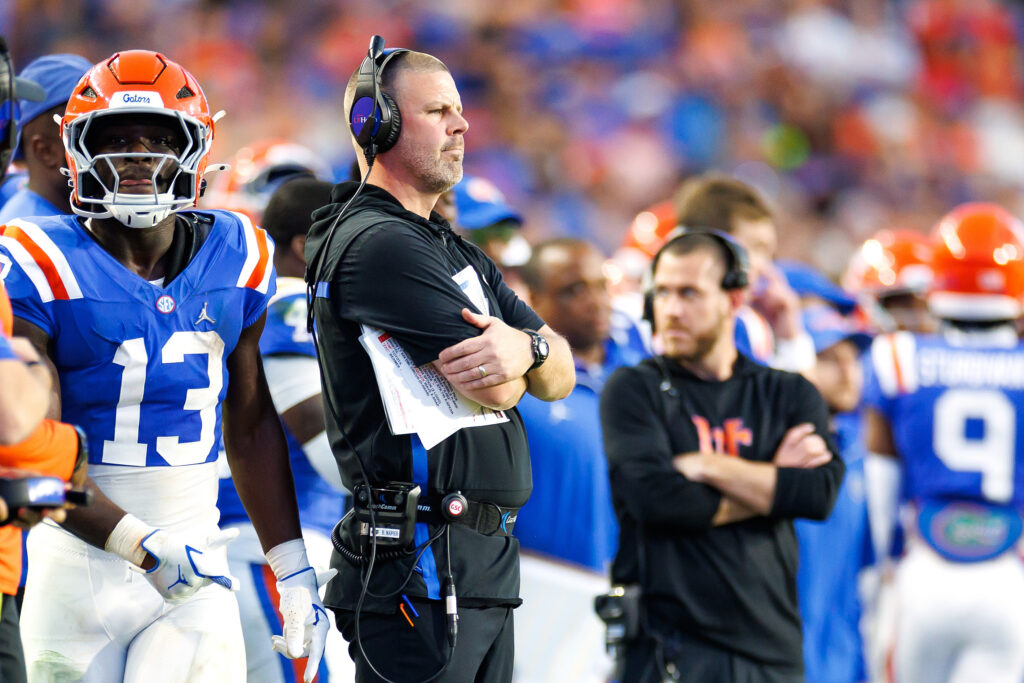On December 24th, 2023, Trevor Etienne transferred from Florida to Georgia, where he was ranked 18th overall in 24/7Sports transfer portal rankings. He shares much of the same attributes as his brother Travis: agile, identifies open running lanes quickly, and plays with a high motor. Having Trevor Etienne took pressure off now-redshirt senior Graham Mertz.
It is fair to anticipate that Florida will now have to pass the ball more to offset Etienne’s productivity (averaging over 700 yards per season and seven touchdowns). This is not a knock on Mertz but Florida does not need to pass the ball more. In fact, given their offensive stats last season, the strong running back room Florida has aside from Etienne this season, and Billy Napier‘s overall offensive philosophy, it is essential that Florida must run the ball more in 2024.
Why Florida Must Run the Ball in 2024
Florida Was Inefficient Passing Last Season
It is to be expected to see some growing pains after replacing Anthony Richardson. And, all things considered, Mertz played well enough to undoubtedly be Florida’s 2024 starter. As shown in the chart below, he had a career season and protected the ball well, which at times, he struggled to do while at Wisconsin.
What’s not being told despite these stats is how inefficient Florida was last season passing. Florida was ranked 101st in the country at passing yards per completion and 88th in third-down percentage. By evaluating Mertz’s stat line and seeing Florida was ranked 35th in the country with 28.2 points per game, all signs would point that the defense is the primary problem.
It is not so much that Florida cannot pass the ball or that they are not passing enough; the fundamental issue is Florida’s offense is not getting enough explosive plays. To what extent that will change is likely slim, since even during Napier’s time at Louisiana, which will be elaborated on later, Florida’s offense is predicated (and arguably most successful) on quick passing plays.
This is a stark contrast compared to 2022 Florida which made 64 more deep passing attempts. Granted, Mertz has improved on his deep ball accuracy, however, Napier should not be asking him to make those same throws as Richardson routinely did. Who’s to say that the offensive line will hold up enough to allow those plays to develop?
Besides pointing out that Florida’s offensive line gave up a staggering 39 sacks last season, what also gets overshadowed is Florida does not have an obvious deep threat that elite defenses like Ole Miss and Georgia will have to respect. Last season, the best equivalent to that was Ricky Pearsall, who has electric speed, can break tackles, and was not afraid to take big hits after finding the weak spots in zone coverages. Caleb Douglas, who transferred to Texas Tech this offseason, would have played a similar role, as he is due for a breakout year.
Florida Is Set At the Position
While it would be great to have Etienne back for his junior season, Florida has bigger holes in the roster than at halfback. In fact, for the majority of the season, they primarily played in a two-running back system, which is becoming more prevalent, particularly in the past decade of college football. Florida should be more dependent on senior running back Montrell Johnson, Jr., who followed Napier from Louisiana to Florida in 2021.
And judging from his productivity in the past few seasons, this is not as big of an issue as it is set out to be. In all three of his collegiate seasons, he has run for a combined 27 touchdowns and has minimally run for 800 yards on average.
He is a high-character athlete, a workhouse, and a much better pass blocker than he gets credit for. Rushing for 1,000 yards does not seem so far-fetched anymore, even though Napier had this to say about the upcoming 2024 Florida running back class of Kahnen Daniels and Jadan Baugh: “These two backs that we added to our team, they’re both exceptional,” (Gator Country). For the time being, the two can be situational backs and learn the system so they can be ready for their sophomore season.
Florida Is At Their Best With The West Coast Style Offense
Throughout Napier’s coaching career, he primarily ran a West Coast offense and was successful at his most two recent stops. He served for a season under Todd Graham at Arizona State before his four seasons at Louisiana.
Under Napier, they had a balanced attack and exceeded expectations by making an appearance in the Sun Bowl and players such as eventual NFL wide receiver N’Keal Harry and Kalen Ballage lit up the stat sheet. Harry led the team with 1,200 yards receiving and Ballage ran for 1,700 all-purpose yards in his final seasons at Arizona State. When Graham was replaced by Herm Edwards, he offered to retain Napier before his departure.
Looking back at Napier’s time at Louisiana, he ran an offense similar to what fans saw last year with Mertz. Louisiana would typically run with two-tight end sets even out of the shotgun to keep opponents honest, such as this 99-yard house call versus Arkansas State.
☎️ Crib Call!#cULture | #GeauxCajuns pic.twitter.com/zeB89enUdx
— Louisiana Ragin’ Cajuns® Football (@RaginCajunsFB) October 22, 2021
Even analyzing some general quarterback stat lines, Louisiana’s quarterback, Levi Lewis (just like Mertz last season) posted a 5:1 touchdown-to-interception ratio in 2021 and fed Johnson on critical third downs and most importantly in the red zone. Ultimately, this gave Louisiana their first Sun Belt Conference championship since 2013 when they shared with Arkansas State since they did not have a title game until 2018.
Florida’s Offense Has Plenty of Potential
While Florida’s offensive stats are not flashy, they don’t need to be to compete in the SEC. It has always been fought in the trenches. Florida has been on the losing end of that battle all too often. Fortunately, there is still time for Florida to add some prospects in the spring window.
Having single-digit turnovers over the course of twelve games possibly offsets being 101st in passing efficiency. Yet again, that can be easily justified seeing how often Johnson and Etienne were trusted to gain pivotal yards in a multitude of different sets and packages. If anything, the pistol and shotgun packages will be expanded upon to keep defenses honest.
Florida’s offense does not need an overhaul. In a college football world where quarterback box stats take up too many headlines, Florida should avoid that temptation, despite it pointing out that Florida should be building up Mertz’s strong showing last season. However, it can be built upon by Napier taking some more chances down the field, trusting Johnson, and (perhaps most importantly) relying on history, which more often than not, finds a way to repeat itself for good or bad.
Main Image: Matt Pendleton/Gainesville Sun / USA TODAY NETWORK



